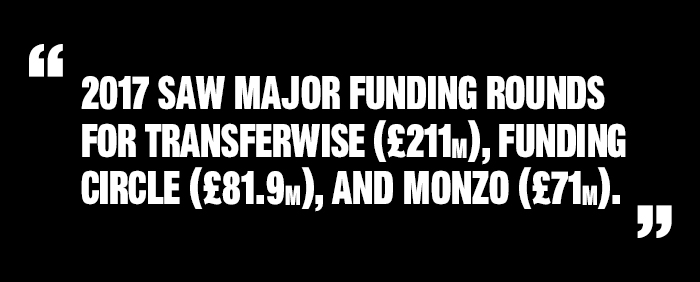FinTech: standing out in a ubiquitous market
by Jessica Wardle, Managing Partner, M&C Saatchi Export
From Blockchain and crypto-currencies to retail banking, FinTech has exploded onto the global stage. Average global adoption now stands at 33%, up from 16% in 2015 and one-third of consumers utilise at least two or more FinTech services and are increasingly aware of it in their daily lives. (Ernst and Young FinTech Adoption Index)
The emergence of ‘FinTech hubs’ has mirrored this growth.
With destinations vying for dominant global and regional positions, it is a crowded and noisy marketplace. A search for ‘FinTech hub’ reveals results for over 15 different destinations on Google’s front page whilst a roundup of the top FinTech forums highlighted 16 ‘must see’ events just in Europe this year.
FinTech has become more than a simple vertical. It is now synonymous with technology and innovation and for many destinations competing for FDI, a crucial component
Set against the context of falling global FDI inflows (which dropped 23% in 2017) global FinTech investment has grown strongly, accounting for $57.9bn of global investment in the first half of 2018.
The UNCTAD business survey forecasts that technological change, including the digital economy, will be the number one factor that will increase global FDI inflows. This is borne out in markets such as Singapore who reported that a quarter of new jobs in their growing financial services industry were created by FinTech over the past two years. And the UK, where FinTech was the leading sector for VC tech investment in 2017, attracting a record £1.34 billion in VC funding. (PitchBook December 2017)

So, as FinTech offerings become more ubiquitous, what role can marketing play to give destinations better cut through?
1. Shape your own narrative
It’s crucial to understand your destination’s FinTech story. Clarity and focus can aid differentiation; and leveraging your place brand as part of this story can help build affinity.
Switzerland’s Zug ‘Crypto Valley’ has consciously focussed on establishing a positioning as the world’s leading Blockchain and cryptographic technology ecosystem – building on the stability and security promise of Switzerland’s nation brand and maintaining strategic and stylistic consistency.
2. Be part of the conversation
Create ongoing moments of relevance to boost awareness and engagement.
Partnerships and events, as well as SEM and micro-outreach, can reach new audiences and create value that punches above its weight. The Fintastic Bahrain Week FinTech festival successfully partnered with EuroMoney this year to grow their audience and affirm their credibility.
3. Reframe regulation
Regulation has the power to unleash or stymy FinTech innovation and, as such, can be harnessed as a positive and impactful messaging area. Malta’s approach to regulation has supported their positioning as ‘the world’s blockchain island’ and the Monetary Authority of Singapore’s willingness to create a flexible regulatory environment has received much acclaim.
Regulatory news and updates, when framed through clear audience benefit, can act as a powerful tool as part of a marketing content strategy.
4. Build on existing foundations
FinTech companies thrive in destinations with strong existing financial credentials. They have the infrastructure, the regulation and the talent which can support more agile contenders. London explicitly link their leading FinTech position to their status as the world’s largest financial services sector.
Finding effective ways to leverage messaging from both financial services and technology sectors to underpin FinTech communications will helps strengthen your case and draw on existing equity.
5. Support collaboration
FinTech ecosystem trends have evolved, moving from disruption towards collaboration. Traditional corporations are seeking to partner with FinTech start-ups to fast track innovation and hubs are exploring relationships with one another – such as the Luxembourg and Belgium MOU signed in February.
The digital skills deficit, however, is the biggest issue facing fast growing economies, creating vulnerabilities and hindering scale. The new generation of technologists are digital nomads who make use of the myriad of online collaboration tools at their disposal to become a mobile workforce.
Learnings can be drawn from Startup Genome’s Global Startup Ecosystem Report 2018 which showed that overall ecosystem performance correlates highly with a tightly-knit community. Destinations should be asking themselves what initiatives can marketing spearhead to foster collaboration and cross fertilisation domestically and cross-borders?
In summary, by establishing a clear story, giving it relevant support and maximising opportunities for engagement you have the opportunity to use marketing to give your destination a significant advantage, build profile as well as support both talent and investment attraction.
About M&C Saatchi
M&C Saatchi is a global communications agency with significant place branding expertise, spanning tourism and FDI.
We help brands position themselves for international success and launch into new markets, without building local agency infrastructure. We deliver marketing and communication strategies that help clients unlock new audiences and opportunities across the globe.
Jessica Wardle, Managing Parner, M&C Saatchi and Mary Harris, Managing Director, M&C Saatchi Export will be leading a thought-provoking panel on driving sector specific engagement, alongisde Louise Juhl and Claus Lonborg, Copenhagen Capacity, and Jo Simmons, LinkedIn, at the City Nation Place Global conference.









